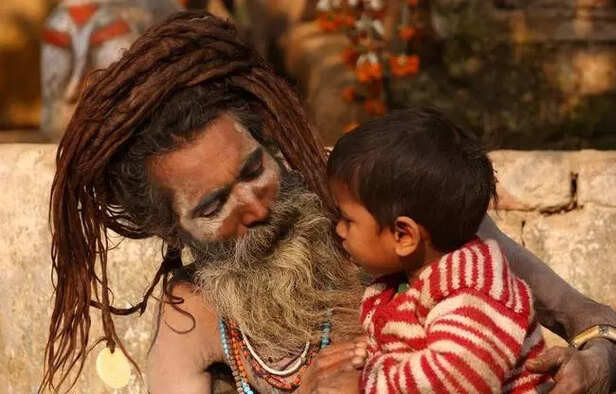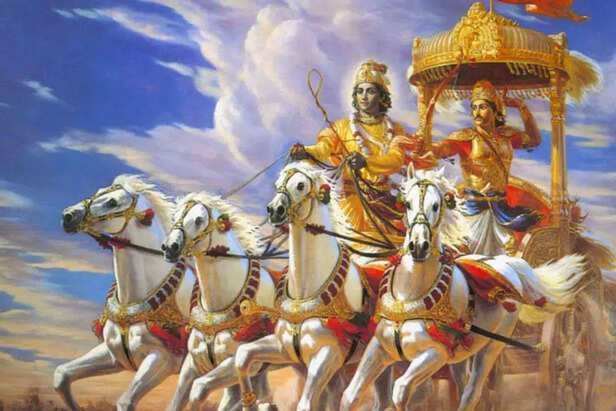Was SANATANA DHARMA the World’s First Religion? Unraveling the Eternal Truth
Nidhi | Jan 30, 2025, 20:09 IST
( Image credit : Timeslife )
Sanatana Dharma is often considered the world's oldest spiritual tradition, predating organized religions and influencing Hinduism. But was it the first religion? This article delves into its origins, ancient teachings, and how it shaped global spirituality. We examine the evidence, explore its philosophical depth, and uncover why Sanatana Dharma remains relevant today.
Since the dawn of civilization, humanity has sought answers to life’s greatest mysteries—Who are we? Where did we come from? What is our purpose? Among the many spiritual traditions that have guided mankind, Sanatana Dharma stands out as one of the oldest and most profound. But was it the first religion of the world? Did it give birth to what we now call Hinduism? And does its wisdom hold the key to understanding the universe even today?Let’s embark on a journey through history, philosophy, and evidence to uncover the eternal truth of Sanatana Dharma.

The term Sanatana Dharma is often mistaken as just another name for Hinduism. However, it is more than a religion—it is a way of life, a philosophy that transcends time, geography, and religious boundaries.
Sanatana Dharma does not impose rigid beliefs but encourages individuals to explore their own path to truth (Satya), self-realization (Atman), and ultimate liberation (Moksha).
If Sanatana Dharma is eternal, does that mean it was the first spiritual system of humankind? While history has no definitive way of proving which belief system came first, some compelling arguments suggest Sanatana Dharma may indeed be the oldest organized spiritual tradition:
If Sanatana Dharma is eternal, why do we refer to it as Hinduism today?

Sanatana Dharma’s wisdom is not just ancient—it is timeless. Here are some of its core teachings that continue to inspire millions:
Despite being thousands of years old, Sanatana Dharma remains more relevant than ever:
So, was Sanatana Dharma the original religion of the world? While we may never have a definitive answer, one thing is certain—its wisdom predates recorded history, influences countless traditions, and continues to guide seekers of truth today.
Sanatana Dharma is not just about gods, temples, or rituals. It is about understanding life, the universe, and our place within it.
Perhaps, instead of asking whether it was the "first religion," we should ask:
Is it the last one we’ll ever need?
Because if truth is eternal, then Sanatana Dharma will never fade—it will only evolve, just as it always has.
If this perspective resonates with you, consider exploring the Vedas, Upanishads, and Bhagavad Gita for deeper insights. How do you see the relevance of Sanatana Dharma in today's world? The conversation is endless, just as truth itself.
What is Sanatana Dharma?

Naga Sadhu
( Image credit : Timeslife )
The term Sanatana Dharma is often mistaken as just another name for Hinduism. However, it is more than a religion—it is a way of life, a philosophy that transcends time, geography, and religious boundaries.
- Sanatana means eternal, timeless.
- Dharma refers to duty, righteousness, and cosmic order.
Sanatana Dharma does not impose rigid beliefs but encourages individuals to explore their own path to truth (Satya), self-realization (Atman), and ultimate liberation (Moksha).
Origins: Was Sanatana Dharma the First Religion?
1. The Vedas: The World’s Oldest Scriptures
- The Rigveda, one of the four Vedas, is the oldest religious text known to humanity, with scholars dating its origins to around 1500 BCE or earlier.
- The Vedas contain advanced knowledge of astronomy, mathematics, medicine, and consciousness—ideas that were far ahead of their time.
2. The Concept of an Eternal Truth
- Unlike other religions that emerged from a specific prophet or divine revelation, Sanatana Dharma believes that truth (Dharma) is universal and eternal—it was never "created" but always existed.
- This idea aligns with many ancient cultures that adopted similar cosmic and spiritual laws.
3. Influence on Other Spiritual Traditions
- Many elements of Sanatana Dharma—such as meditation, yoga, karma, and dharma—are found in Buddhism, Jainism, and even Western philosophies.
- Some scholars argue that early religious practices in Mesopotamia, Egypt, and Greece may have been influenced by Vedic thought.
Sanatana Dharma and the Birth of Hinduism
- The word "Hindu" was a geographical term used by Persians to describe people living beyond the Sindhu (Indus) River.
- During Mughal and British rule, the diverse spiritual traditions of India were collectively labeled as "Hinduism."
- In reality, what we call Hinduism today is simply Sanatana Dharma, shaped by centuries of cultural evolution.
Teachings of Sanatana Dharma That Shaped the World

Dharma
( Image credit : Timeslife )
Sanatana Dharma’s wisdom is not just ancient—it is timeless. Here are some of its core teachings that continue to inspire millions:
- Dharma (Righteous Duty): Every individual has a role to play in maintaining cosmic balance.
- Karma (Cause and Effect): Our actions determine our future experiences, guiding us toward self-awareness and responsibility.
- Moksha (Liberation): The ultimate goal is to break free from the cycle of birth and death (Samsara) and unite with the eternal consciousness.
- Ahimsa (Non-Violence): A principle adopted by figures like Gandhi, inspiring global movements for peace and justice.
- Yoga and Meditation: Practices designed to align the body, mind, and soul with the universe.
Sanatana Dharma in the Modern World: Why It Still Matters
- Spiritual Inclusivity: In a world divided by religious dogma, Sanatana Dharma teaches unity in diversity—there is no "one way" to the Divine.
- Scientific Wisdom: From Ayurveda to Quantum Physics, many of Sanatana Dharma’s ancient insights align with modern scientific discoveries.
- Sustainability & Harmony: Its reverence for nature (Prakriti) promotes environmental consciousness and ethical living.
- Mental and Emotional Well-Being: The growing popularity of yoga, meditation, and mindfulness stems from the Vedic tradition.
The Eternal Relevance of Sanatana Dharma
Sanatana Dharma is not just about gods, temples, or rituals. It is about understanding life, the universe, and our place within it.
Perhaps, instead of asking whether it was the "first religion," we should ask:
Is it the last one we’ll ever need?
Because if truth is eternal, then Sanatana Dharma will never fade—it will only evolve, just as it always has.
If this perspective resonates with you, consider exploring the Vedas, Upanishads, and Bhagavad Gita for deeper insights. How do you see the relevance of Sanatana Dharma in today's world? The conversation is endless, just as truth itself.
